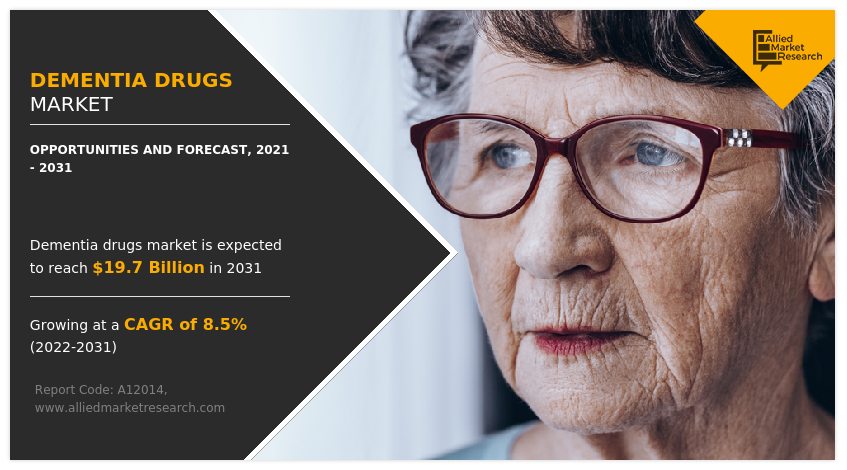Dementia is not a specific disease, but rather a general term for the impaired ability to remember, think, or make decisions that interfere with daily activities. Alzheimer’s disease is the most common type of dementia. Although dementia primarily affects the elderly, it is not part of normal aging. Since dementia is an umbrella term, its symptoms can vary greatly from person to person. People with dementia have problems with memory, communication, reasoning and problem solving.
A healthcare professional can perform tests of attention, memory, problem solving, and other cognitive skills to see if there is cause for concern. A physical exam, blood tests, and brain scans such as a CT scan or MRI can help determine an underlying cause. Treatment of dementia depends on the underlying cause. Neurodegenerative dementias, such as Alzheimer’s disease, have no cure, although there are drugs that can help protect the brain or control symptoms, such as anxiety or behavioral changes. Research to develop more treatment options is ongoing. Leading a healthy lifestyle, which includes regular exercise, healthy eating and maintaining social contacts, decreases the chances of developing chronic diseases and can reduce the number of people with dementia.
The global dementia drugs industry generated $8.7 billion in 2021, and is anticipated to generate $19.7 billion by 2031, witnessing a CAGR of 8.5% from 2022 to 2031.
Download Free Sample Report- https://www.alliedmarketresearch.com/request-sample/12379
Prime determinants of growth
Increase in the prevalence of Alzheimer’s disease, advancement in R&D activities for drug development, rise in the adoption of early diagnosis, the growing geriatric population, increase in investment in R&D by players, presence of robust pipeline candidates, increase in public awareness about the disease prevention in developing regions, and the surge in demand for personalized medicines drive the growth of the global dementia drugs market. However, strict government regulations related to product approval and high cost linked to R&D activity restrain the growth of dementia drugs industry. Conversely, accelerated technological advancement in drug discovery techniques and high investment for drug development by the government are expected to offer lucrative opportunity for the dementia drugs market in future.
Covid-19 Scenario
- The outbreak of the Covid-19 pandemic had a positive impact on the global dementia drugs market, as it was reported that the pandemic caused a significant rise in the number of dementia patients.
- Some research has shown that the COVID-19 infection can increase a person’s likelihood of developing dementia and cause the symptoms to show up earlier.
Moreover, COVID-19 shows adverse impact on brain function by reducing the level of consciousness. Thus, increase in COVID-19 infection in patients with Alzheimer’s disease increased the demand for dementia drugs during the pandemic.
—
Dementia drugs are a rapidly growing market, as the world population is aging and more people are being diagnosed with dementia. The demand for these drugs is increasing significantly, as they can help to slow down the progression of dementia and improve quality of life for those living with this condition.
The Dementia Drugs Market has seen an influx of new players in recent years, as pharmaceutical companies have invested heavily in research and development to develop new treatments for this debilitating condition. The global market size is expected to grow significantly over the next few years, due to increasing awareness about dementia and its impact on individuals’ lives. This growth will be driven by improved access to medications, increased research into potential treatments, and better diagnosis techniques.
The Alzheimer’s disease segment to maintain its leadership status throughout the forecast period
Based on indication, the Alzheimer’s disease segment held the highest market share in 2021, accounting for around three-fifths of the global dementia drugs market, and is estimated to maintain its leadership status throughout the forecast period. This is owing to the increase in life expectancy, rise in ageing population, and changes in lifestyle. However, the vascular dementia segment is projected to manifest the highest CAGR of 10.0% from 2022 to 2031, owing to an increasing number of people, especially geriatrics and smokers, with high risk of developing vascular dementia as well as increasing understanding of diagnosis modalities.
Speak to our Analyst https://www.alliedmarketresearch.com/connect-to-analyst/12379
The hospital pharmacies segment to maintain its lead position during the forecast period
Based on distribution channel, the hospital pharmacies segment accounted for the largest share in 2021, contributing to nearly half of the global dementia drugs market, and is projected to maintain its lead position during the forecast period. This is owing to the increase in geriatric population and Alzheimer’s patients. However, the online pharmacies segment is expected to portray the largest CAGR of 11.1% from 2022 to 2031, owing to the convenience and cheaper costs of purchasing prescription drugs electronically, especially under the lockdown situation during the COVID-19 pandemic.
North America to maintain its dominance by 2031
Based on region, North America held the highest market share in terms of revenue in 2021, accounting for more than two-fifths of the global dementia drugs market, and is likely to dominate the market during the forecast period, owing to the increase in R&D investments by numerous companies in the region. However, the Asia-Pacific region is expected to witness the fastest CAGR of 10.6% from 2022 to 2031. Increase in spending capabilities, owing to the evolving healthcare regulatory landscape, increase in the number of patients with chronic diseases, and the government’s emphasis on enhancing R&D capabilities for innovative drug development in the region.
Leading Market Players: –
- Apotex inc.
- Aurobindo Pharma Ltd.
- Biogen Idec
- Eisai
- Eli Lilly and Company
- Johnson & Johnson
- Abbvie Inc.
- F. Hoffmann-La Roche AG
- Teva Pharmaceutical Industries
- Novartis AG
